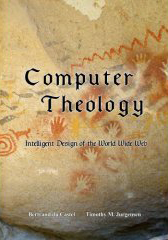PRESS
COMPUTER THEOLOGY |
||||
|
Rather, the intervals are
generally determined by levels of various chemical factors, which may increase
or diminish at varying rates, so they are only qualitatively based on time.
Thus, in order to identify true digital mechanisms within the body, it would
seem necessary to identify pure time based processes. In fact, are there any
such processes? Well, the
cognitive ability of the mind to perceive the passage of time derives almost
completely from the sensori-motor experience, not from some well regulated
clock circuit as it is in a digital computer. That is, the mind understands the
passage of time through relating the temporal extent of previous, particularly
repeated, episodes. The passage of five minutes is how long it took to
accomplish a particular activity. The sensori-motor experience can be extremely
subtle, like the sensitivity to fine clues in the environment that make us wake
up the day of the exam just one minute ahead of the alarm clock. If presented
with an environment in which external stimuli are greatly reduced, then one’s
ability to accurately comprehend the passage of time, at least at a
fine-grained level, is severely diminished. For example, when placed in a state
of severe sensory deprivation, a person’s cognitive perceptions of reality can
be greatly altered. This effect can be so extreme as to actually be considered torture
in certain situations. Depriving a
person of sleep for a long period of time has been used to extract confessions
to crimes, sometimes totally fabricated confessions. Removing routine temporal
markers such as light and dark or manipulating environmental factors are
techniques that have also been used to induce stress in prisoners. The bottom
line is that there are few direct relationships between cognitive processes and
an abstract determination of time. Rather, most actions and reactions of the
body derive for indirect associations with time. At a very basic sub-cognitive level,
there are recognized, repetitive sequences that drive many processes within the
body; one such mechanism being the circadian rhythm, a term
that derives from the Latin and means around a day. However, the study of the
association of basic biological processes with an abstract concept of time (chronobiology) has not established
associations that would offer the quantitative periodicity of digital
biological processes, at least at a fine grained level. Finally, in our cursory review of the facilities of the mind, we turn our attention to emotion. Emotions are a reflection in the mind of the cumulative effects of sensory inputs; in essence, the emotions provide a value judgment of the net effect of the contextual integration of sensory input. Klaus Scherer, in The Nature of Emotions (edited by Paul Ekman and Richard Davidson), suggests that emotions lay between sensory input and response output. In effect, emotions present an assessment of the timeframe within which a person’s motor system must respond to sensory input. If one hears a loud noise nearby, we may jump if our emotions tell us we have to respond quickly. If we stand beside the road and hear the distant sound of an approaching car then we cognitively formulate the more leisurely response of moving a bit further off the road and turning to watch the car as it passes, because our emotions did not put a stamp of urgency on the response. We interpret this line of reasoning to suggest that emotions can be related to the needs hierarchy; and, through this relationship, they can affect action stimuli ranging from the near reflexive to the cognitively derived. At the most basic, emotions seem directly tied to the appetites that form the stimuli related to needs. Thus, emotion is a moderator to the impetus provided by the brain to enable action by the body. The stimuli provided by emotions range from just beyond instinctive reflex responses to conscious, premeditated action. Scherer also observes that in a situation that is so urgent there is little time for what he terms ego-involvement. The mind is forced to resort to what he calls the wisdom of the body to effect a response stimulus. It would seem to us that the mirror neuron structures that we reviewed a bit earlier, with their facility for context-based metaphorical comprehension encompassing both emotional assessment and cognition-based action response stimulation, suggest an appropriate mechanism for effecting this wisdom of the body. We |
||||
|
||||
© Midori Press, LLC, 2008. All rights reserved for all countries. (Inquiries) The contents of ComputerTheology: Intelligent Design of the World Wide Web are presented for the sole purpose of on-line reading to allow the reader to determine whether to purchase the book. Reproduction and other derivative works are expressly forbidden without the written consent of Midori Press. Legal deposit with the US Library of Congress 1-33735636, 2007.
|
ComputerTheology Intelligent Design of the World Wide Web Bertrand du Castel and Timothy M. Jurgensen Midori Press, Austin Texas 1st Edition 2008 (468 pp) ISBN 0-9801821-1-5 |
Book available at Midori Press (regular) |
